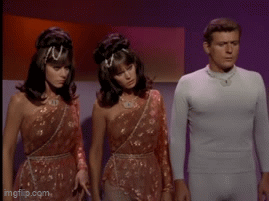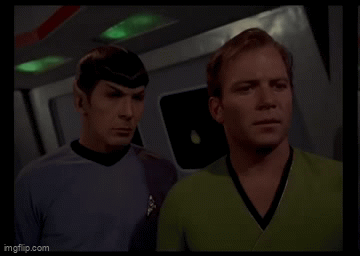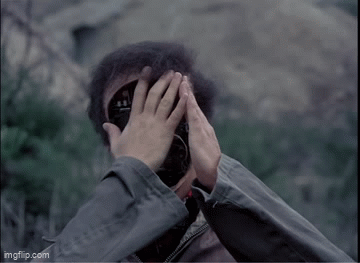They’d wear sparkly purple leotards and have silver skin.
-
Welcome! The TrekBBS is the number one place to chat about Star Trek with like-minded fans.
If you are not already a member then please register an account and join in the discussion!
You are using an out of date browser. It may not display this or other websites correctly.
You should upgrade or use an alternative browser.
You should upgrade or use an alternative browser.
What do you think a Borg Drone would look like in TOS?
- Thread starter Astrostars2025
- Start date
Can't recall any example in US based media sci-fi, but funny enough British science fiction did literally just a month after Trek premiered with "The Tenth Planet" on "Doctor Who". The subsequent designs became ever more generically robotic looking, but that first concept with the surgical gauze covered faces and tubing everywhere is not that radically different from the Borg. Paint the Borg silver or the Cybermen gun metal grey and the resemblance would be even stronger.First thing that comes to mind is that the Six Million Dollar Man was a few years away after TOS. So was the idea of a human with mechanical/electronic parts—a cyborg—a common enough idea in the 1960s?
Heh, as i was reading this thread I was having very similar thoughts, particularly that the Borg and their "unfinishedness" don't really make sense. They probably should have all been like the Queen in First Contact, maybe with an added robot arm for some drones.So strictly speaking a TOS Borg might be conceived as a race that captured humanoids to “improve” them with artificial parts. Problem with that is it seems to make more sense to just build Ruk like androids because even a Mudd like android with a humanoid brain put into it might be more challenging to “programme.”
When I look at the concept this way it makes me think the TNG concept of the Borg might not really make much sense at all.
They do look a bit like the mop bucket and heating duct robots of previous decades.Heh, as i was reading this thread I was having very similar thoughts, particularly that the Borg and their "unfinishedness" don't really make sense. They probably should have all been like the Queen in First Contact, maybe with an added robot arm for some drones.

I think the Borg would have been VASTLY different had they appeared on Roddenberry's TOS. The man was a Humanist. Yes, TOS had adversaries in the Klingons and the Romulans. But Roddenberry gave each adversary characters that had some redeeming qualities. Not all of them were absolute evil. Even the Gorn was given some redeeming features, which represented a huge change from Fredric Brown's original story, Arena.
So, had the script for the first Borg episode crossed his desk, I suspect Gene would have taken it apart. It would have been severely revised. The vile Borg would not be so vile.
So, had the script for the first Borg episode crossed his desk, I suspect Gene would have taken it apart. It would have been severely revised. The vile Borg would not be so vile.
You might want to review the Klingon's first appearance. Not too many (if any) redeeming characteristics there. Colicos plays Kor with a certain amount of charm, but this is the guy who rules with an iron fist, orders torture and mass executions. Kirk's description of life under Klingon rule doesn't sound all that pleasant, either. Future encounter with most Klingons do little to make them "redeemable" either. The next major Klingons, Kolath and Korax, are swaggering braggarts with a touch of smarm. Complicit in sabotage and subterfuge. Kang seems alright, the best of the lot.I think the Borg would have been VASTLY different had they appeared on Roddenberry's TOS. The man was a Humanist. Yes, TOS had adversaries in the Klingons and the Romulans. But Roddenberry gave each adversary characters that had some redeeming qualities. Not all of them were absolute evil. Even the Gorn was given some redeeming features, which represented a huge change from Fredric Brown's original story, Arena.
So, had the script for the first Borg episode crossed his desk, I suspect Gene would have taken it apart. It would have been severely revised. The vile Borg would not be so vile.
Romulans are a different story. We are supposed to have some sympathy for the Commander and the Centurion. Men caught up in a situation beyond their control, but trying to be good people.
So no, I don't think TOS Gene would have given the Borg a redemptive quality in the first story. Like in TNG, the humanization would have come in later scripts. The first story was about creating a "Boogey Man", not a redemptive adversary,
The Borg were vile? Seems and odd descriptor for them. They’re essentially machines programmed to evaluate and assimilate technology.
I am referring to the very first episode where they appeared: Q Who. They were without any redeeming qualities. It's the episode where Guinan tells Picard that the Borg annihilated her home world. "They're called the Borg," she said. "Protect yourself, Captain, or they'll destroy you."
I could be wrong, of course. I often am. But, after reading the official Roddenberry bio, I just do not see him allowing this. All creatures and all alien races in Roddenberry's Star Trek had some redeeming features. The Borg were not given anything remotely promising in that first episode.
Even in the first episode where Shatner encountered the Romulan warship intent on destruction, you discovered an alien commander who uttered the line, "I could have called you friend."
Roddenberry served in WWII. The man knew war. He lived with it every day. It had an effect on him later in life. That's why you would never see any all out conflicts on TOS. Roddenberry would not have allowed it.
You are, of course, correct. But it also comes with a caveat. You are right, the Klingons themselves do not show any redeeming qualities. However, and this is the caveat, those qualities are revealed. Not by the Klingons of course. but by the Organian race. Are you thinking of the same line I am thinking of?You might want to review the Klingon's first appearance. Not too many (if any) redeeming characteristics there. Colicos plays Kor with a certain amount of charm, but this is the guy who rules with an iron fist, orders torture and mass executions. Kirk's description of life under Klingon rule doesn't sound all that pleasant, either. Future encounter with most Klingons do little to make them "redeemable" either. The next major Klingons, Kolath and Korax, are swaggering braggarts with a touch of smarm. Complicit in sabotage and subterfuge. Kang seems alright, the best of the lot.
"Oh, eventually you will have peace, but only after millions of people have died. It is true that in the future, you and the Klingons will become fast friends. You will work together."
That one line from Ayelborne communicates a redeeming feature. It signifies that the Klingons were warlike, but not totally evil. That's a Roddenberry move. That is Roddenberry's TOS. That is the first episode where the Klingon race appeared. The standard and the future was set with that one line. That is the way Roddenberry worked.
TOS is for the most part optimistic. It did the occasional downer ending (A Private Little War, COTEOF) but like to keep things positive. But as illustrated the Klingons remained the "bad guys" through out TOS with no hint of a peaceful future. As as mentioned, the road to that future is filled with death. So I don't think which ever Gene (Coon or Rod) wrote that line intended it as redemptive.You are, of course, correct. But it also comes with a caveat. You are right, the Klingons themselves do not show any redeeming qualities. However, and this is the caveat, those qualities are revealed. Not by the Klingons of course. but by the Organian race. Are you thinking of the same line I am thinking of?
"Oh, eventually you will have peace, but only after millions of people have died. It is true that in the future, you and the Klingons will become fast friends. You will work together."
That one line from Ayelborne communicates a redeeming feature. It signifies that the Klingons were warlike, but not totally evil. That's a Roddenberry move. That is Roddenberry's TOS. That is the first episode where the Klingon race appeared. The standard and the future was set with that one line. That is the way Roddenberry worked.
Me too.Actually I'm glad that TOS was Borg free
I’ve always resisted this idea because not everything needs to be tied together. Furthermore Vger destroys non-mechanical life rather than assimilate it.I remember years ago ther was a fan theory that the Borg was born from V’Ger. Also I vaguely remember a William Shatner book series suggesting this too but I don’t remember the title of said book.
Last edited:
Yeah I wasn’t found of the idea myself. Think it stems from Decker joining with the machine a.i and the merger of biology and technology somehow creates the Borg and is the next evolution of its existence.I’ve always resisted this idea because not everything needs to be tied together. Furthermore Vger destroys not mechanical life rather than assimilate it.
Pretty sure it’s debunked theory now as Borg have been established existing before the V’Ger incident.
Thats another key point. The impression in TNG, even early on, is the Borg had been in existence for quite some time.Pretty sure it’s debunked theory now as Borg have been established existing before the V’Ger incident.
And I recall in Voyager that some alien race was talking about how the Borg were a lot less expansive some 900 years earlier, but they already were around.Thats another key point. The impression in TNG, even early on, is the Borg had been in existence for quite some time.
Similar threads
- Replies
- 7
- Views
- 402
- Replies
- 5
- Views
- 374
- Replies
- 87
- Views
- 4K
- Replies
- 5
- Views
- 332
- Replies
- 129
- Views
- 4K
If you are not already a member then please register an account and join in the discussion!





